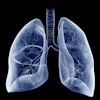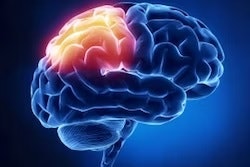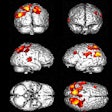Early brain accumulation of amyloid plaque on PET scans is associated with emerging depressive symptoms in cognitively unimpaired older adults, according to a study published August 29 in JAMA Network Open.
The finding has implications for recognizing individuals in preclinical Alzheimer's disease stages who may be candidates for depression treatment, noted lead author Catherine Munro, PhD, a neurologist at Brigham and Women's Hospital in Boston.
“Increasing depressive symptoms over time were significantly associated with early amyloid accumulation in [brain] regions associated with emotional control,” Munro and colleagues wrote.
Depression is common among Alzheimer’s disease patients, with recent research linking elevated depressive symptomatology in part to Alzheimer’s disease pathophysiology, even in preclinical stages, the authors explained. Their aim in this study was to determine whether these associations persist or progress over time.
The researchers analyzed data from 154 participants from the Harvard Aging Brain Study (HABS) who underwent assessments for depression and cognition alongside cortical amyloid PET scans at baseline and then again every two to three years. The mean follow-up period was 8.6 years. All participants were over 60 years old, were cognitively unimpaired, and had, at most, mild depressive symptoms at the outset of the study.
For the analysis, the group studied associations between the depression and cognition tests and amyloid PET scans of several key regions of interest (ROIs) related to emotional control. Specifically, these ROIs included the medial orbitofrontal cortex (mOFC), lateral orbitofrontal cortex, middle frontal cortex (MFC), and the isthmus cingulate cortex (IC).
![Pittsburgh Compound B (PiB) PET distribution volume ratio (DVR) images were projected onto fsaverage surfaces from FreeSurfer and surface smoothed, with PiB (amyloid) slope maps created using ordinary least squares regression (time as only factor) and mixed effects models for 154 participants run at each vertex (P < .01; model: longitudinal Geriatric Depression Scale score estimated by amyloid slope × time + [sex + education + age] × time). This map visualizes the results of the linear mixed-effects models (t score of the main variable, amyloid slope × time) such that regions with a greater t score (red) represent areas in which greater depressive symptoms are associated with greater amyloid accumulation (amyloid slope). Anatomical landmarks are provided: L refers to the left hemisphere, R refers to the right hemisphere, and additional labels indicate the anterior and posterior ends of the brain. Images available for republishing under Creative Commons license (CC BY 4.0 DEED, Attribution 4.0 International) and courtesy of JAMA Open Network.](https://img.auntminnie.com/files/base/smg/all/image/2024/08/PET_depression.66cf997f7e441.png?auto=format%2Ccompress&fit=max&q=70&w=400) Pittsburgh Compound B (PiB) PET distribution volume ratio (DVR) images were projected onto fsaverage surfaces from FreeSurfer and surface smoothed, with PiB (amyloid) slope maps created using ordinary least squares regression (time as only factor) and mixed effects models for 154 participants run at each vertex (P < .01; model: longitudinal Geriatric Depression Scale score estimated by amyloid slope × time + [sex + education + age] × time). This map visualizes the results of the linear mixed-effects models (t score of the main variable, amyloid slope × time) such that regions with a greater t score (red) represent areas in which greater depressive symptoms are associated with greater amyloid accumulation (amyloid slope). Anatomical landmarks are provided: L refers to the left hemisphere, R refers to the right hemisphere, and additional labels indicate the anterior and posterior ends of the brain. Images available for republishing under Creative Commons license (CC BY 4.0 DEED, Attribution 4.0 International) and courtesy of JAMA Open Network.Image and caption courtesy of JAMA Open Network
Pittsburgh Compound B (PiB) PET distribution volume ratio (DVR) images were projected onto fsaverage surfaces from FreeSurfer and surface smoothed, with PiB (amyloid) slope maps created using ordinary least squares regression (time as only factor) and mixed effects models for 154 participants run at each vertex (P < .01; model: longitudinal Geriatric Depression Scale score estimated by amyloid slope × time + [sex + education + age] × time). This map visualizes the results of the linear mixed-effects models (t score of the main variable, amyloid slope × time) such that regions with a greater t score (red) represent areas in which greater depressive symptoms are associated with greater amyloid accumulation (amyloid slope). Anatomical landmarks are provided: L refers to the left hemisphere, R refers to the right hemisphere, and additional labels indicate the anterior and posterior ends of the brain. Images available for republishing under Creative Commons license (CC BY 4.0 DEED, Attribution 4.0 International) and courtesy of JAMA Open Network.Image and caption courtesy of JAMA Open Network
Results indicated that increasing depressive symptoms over time were associated with both increasing cortical amyloid levels in the mOFC, MFC, and IC and with decreasing performance on objective cognitive measures.
Additionally, the associations between early amyloid accumulation in these regions and depressive symptoms over time remained significant, even after adjusting for longitudinal cognitive changes, the group wrote.
“While the effect sizes of the associations observed were small, they were within the magnitude of effect sizes we have observed in similar investigations in the HABS cohort and have important theoretical significance,” the researchers noted.
Namely, the study highlights that emerging depressive symptoms in older adults may not solely represent a psychological reaction but also might have a neurological basis localized to amyloid accumulation in frontal and cingulate cortices, they suggested.
“These results shed potential light on the neurobiology of depression in older individuals and underscore the importance of monitoring new and increasing affective symptoms in addition to cognitive changes in older adults presenting in psychiatry clinics and when screening for [Alzheimer's disease],” the group concluded.
The full study is available here.




















